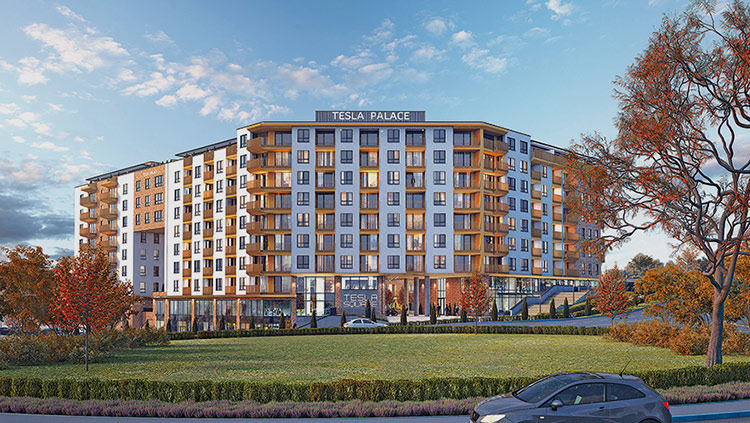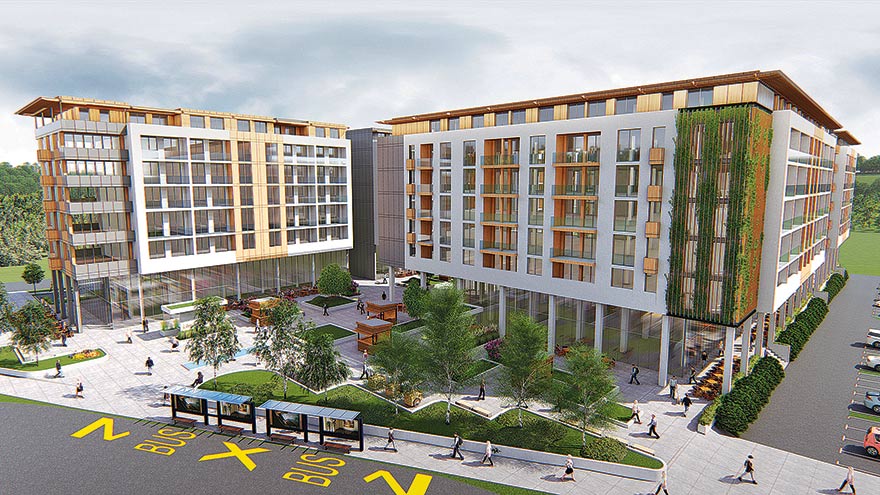ARIS is a relatively young bureau that was founded in 2016 as a partnership between engineers who had already worked together for many years. The studio is successfully engaged in design, supervision, project management and consulting in the field of construction
We have correctly and at the right time dimensioned and structured a company that can respond to such challenging and complex project demands. There are above all large complexes in Kragujevac for clients like Tesla Palace, Euro Motus Real Estate, Delta Real Estate, JDM Real Estate – says the Simović tandem.
How did you profile yourself in the industry and how did the development of your design office go?
Petar: The idea of ARIS from the start was to position it as a reliable partner for design and all the other activities in design and engineering in Kragujevac and beyond. We recognised a lack of local quality service, while Kragujevac has experienced a kind of expansion and development in the last ten years, so it was logical to focus on narrow specialisation.
You have a brilliant team of experienced professionals that you have been working with for years? Without their expertise, understanding and complementarity, you wouldn’t be so successful?
Marija: That’s true and we saw the first five years of the company’s development as a period to profile our services, so we specialised ARIS as a bureau that provides quality service in architectural and construction design, with permanent, high quality external associates necessary to complete the documentation so we can provide a complete service.
It is important to understand all the specifics of the different phases of a project so that the final product is satisfying to both clients and ourselves as designers
We have invested a lot of time and effort in mastering and forming knowhow, especially for coordinating projects on a small scale through large and varied typologies. So it is very important to understand all the specifics of the different phases of a project so that the final product is satisfying to both the client and ourselves as designers.
Serbia is seeing building more than ever before, which has its downsides – the chaos of lay and ad hoc architecture. Can this be stopped?
Marija: We think that the regulations that are on their way to be integrated with the EU’s have almost stopped lay architecture. People became aware that permission was needed to build something, so a culture of hiring an architect was established so that at least the bureaucratic part would be respected. In that sense, it has already been taken care of to some extent, but that is the only thing that is right.

And ad hoc architecture, if we define it as something that is designed quickly and without too much attention to the importance that architecture can have for users and the immediate and wider environment, it is present and is initiated by the speed required to spend certain funds or carry out intentions. The only way to stop this is through education, not only education in terms of knowing the importance that architecture can have in everyday life, but also in economic, environmental and social terms, in order to see the benefits of careful planning.
Has the fact that investors have been asking and deciding about everything for the last 20 years done enormous damage? Is Kragujevac one of those cities?
Petar: Stigmatisation of investors through the term investor architecture is a very simple approach to a complex phenomenon. It is quite clear that investors are building for the market, and the market is made up of people, and human expectations from functionality to the aesthetics of space are conditioned by personal and group culture. And changing culture is a slow process that eludes perception.
Investors build for the market, the market is made of people, and human expectations from functionality to the aesthetics of space are conditioned by personal and group culture
We have some good experience with investors, because we cooperate with them, we try to understand them and slightly change their perception and attitude towards space. However, if we analyse the current situation in Kragujevac and Belgrade in more detail, as far as our experience goes, the situation is not so bad at all and has a positive trend. Of course, ‘Parisians’ are still sprouting here and there, but it is impossible and unhealthy to regulate public aesthetics. It must be a matter of evolution. In the end, a more detailed analysis of the time before investor urbanism shows it was also full of omissions and mediocre design and urban solutions, but the past always looks much better than the present.
Do you think that it would be better for the development of the city if there were serious public architectural and urban competitions with the best solutions chosen?
Marija: We are absolutely in favour of a the institution of competition. A choice is good, which is also shown by the fact that private investors sometimes decide to organise internal competitions to be sure they choose the best option for themselves. Public competitions are mostly absent due to the slowness of the whole process and impatience for spending funds. If things were viewed in the long run, there would probably be more interest in organising them.

However, we must note that in the last two years, several interesting competitions have been organised in Serbia and that quality solutions have been chosen. We hope that they will be realised, because that would completely confirm the institution of the competition and lead to greater interest in society.
Although you have completed many buildings, large in size and budget, are there some that stand out, some that you are especially proud of?
Marija: As architects, we started working together on small scale projects of different typologies, from housing to business in a small studio (Studio Simović) that has grown into ARIS. In that period of transition from independent work to a partnership company, we made several interesting miniature residential buildings for which we won prizes and were nominated for prestigious European awards (N1 Housing, N8 Housing), with which we actually presented our architectural vision of transforming the urban environment in Kragujevac.
What are you currently engaged in? Do you have any major projects planned for the next period?
Petar: Right now we are in the big scale phase, mostly residential and business complexes, which is very challenging and implies a completely different logic and design approach. We have correctly and at the right time dimensioned and structured a company that can respond to such challenging and complex project demands. There are primarily large complexes in Kragujevac for clients such as Tesla Palace, Euro Motus Real Estate, Delta Real Estate, JDM Real Estate. Kragujevac is experiencing a serious expansion and as native citizens of Kragujevac we are very happy to have the opportunity to participate in defining new parts of the city. And we hope that we will be able to expand the experience we will gain into the whole region, which is our long-term goal.